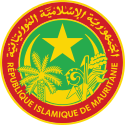 |
|---|
|
Elections to the French National Assembly were held in Mauritania on 10 November 1946. Previously Mauritania had elected MPs in a single joint constituency with neighbouring Senegal, but the new 1946 constitution had separated the two territories politically, giving Mauritania one seat in the Assembly. [1] The result was a victory for Horma Ould Babana, a member of the French Section of the Workers' International. [2] His opponents were Yvon Razac, a member of the MRP and the candidate favored by the French government and traditional Moorish leaders, [3] [2] and Souleymane Diop, an independent.